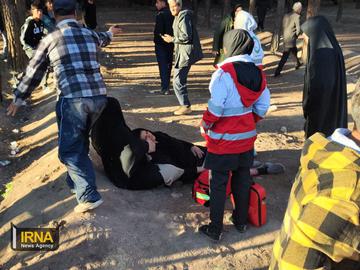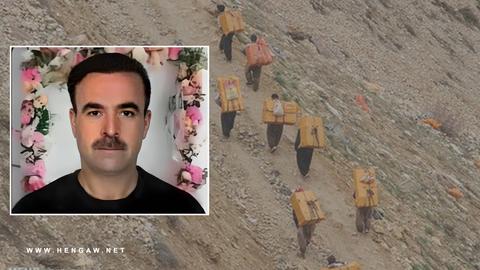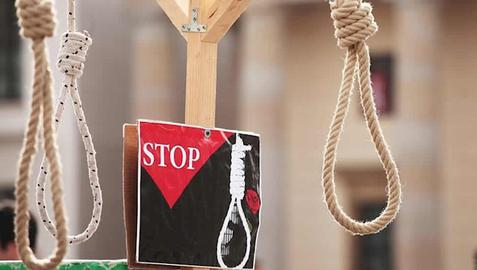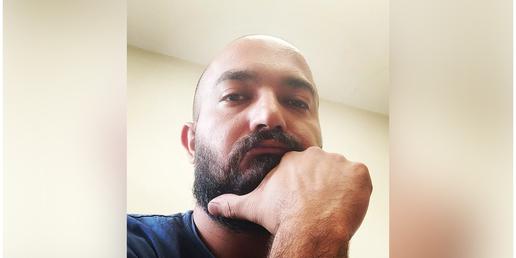Mourners gathered in grief on Friday, January 5, beside the coffins of the victims of two devastating explosions that rocked the city of Kerman earlier this week.
The somber atmosphere was punctuated by weeping as families and friends bid farewell to loved ones – the casualties of the deadliest terrorist attack witnessed in Iran since the 1979 Islamic Revolution.
Iran’s interior minister said on Friday that significant progress had been made in the investigation into the twin explosions. Several suspects, believed to be connected to the attacks, have been arrested, he said.
"Our country's capable intelligence agencies have found very good clues regarding elements involved in the terrorist explosions in Kerman and some of those who had a role in this incident have been arrested," Ahmad Vahidi said, without elaborating.
"We will find you wherever you are," the Islamic Revolutionary Guards Corp (IRGC) commander Major-General Hossein Salami also said, during at the funeral in Kerman's Imam Ali religious center.
"Our enemies can see Iran's power and the whole world knows its strength and capabilities," President Ebrahim Raisi said in a televised address. "Our forces will decide on the place and time to take action."
The attacks, claimed by Islamic State, sent shockwaves through the nation and prompted an outpouring of grief. Footage broadcast on state TV showed mourners at the funerals in Kerman chanting "Revenge, revenge."
But two days after the attack, crucial details such as the exact number of victims and the methods used by the perpetrators are yet to be confirmed. But initial reports from domestic news agencies, such as the Daneshjo news agency, linked the explosion to gas cylinders used in "mourning processions."
The official Islamic Republic News Agency cited an unnamed but “reliable” source who claimed that the January 3 blasts were a suicide bombing attack.
What is evident, however, is the security vulnerability faced by the Islamic Republic both within and outside its borders.
Last year also saw two attacks on a shrine in Shiraz, an attack on a police checkpoint in Rask, and two instances of hackers targeting the country's fuel system.
Additionally, several IRGC commanders, including Seyyed Razi Mousavi, were assassinated outside Iran. Mousavi was killed just days ago in an Israeli airstrike on his location in Syria.
Islamic State group (also known as Isis) claimed responsibility for the Kerman explosions on Thursday, January 4, asserting that two suicide bombers named Umar Al-Muaid and Seifullah Al-Mujahid executed the attack.
The group has also released pictures of these individuals.
Islamic State has previously claimed responsibility for deadly attacks in Iran. While some officials in the Islamic Republic, including some members of parliament, vice presidents, and IRGC commanders, have blamed Israel for the attack, Isis maintains its claim.
"Those whose hands are stained by the blood of innocents, as well as the corrupt and malevolent minds guiding them into this wrongdoing, will be unequivocally targeted," Supreme Leader Ali Khamenei said on the day of the attack.
Reports indicate that the first explosion occurred at approximately 3pm followed by a second explosion at around 320pm, 700 meters away from the site of the first explosion and a kilometer away from Soleimani's tomb.
A military expert on X, formerly known as Twitter, suggested that the attack likely involved improvised and primitive explosives with a complex design, evidenced by white smoke resembling that produced by improvised explosives based on ammonium nitrate.
The limited material damage and lack of significant harm to cars and infrastructure further indicate the attack's "unsophisticated nature."
Initially, the number of victims was reported as 20 people, but by the evening of January 3, it had risen to over 100.
However, on January 4, the number was revised to 84, with the country's emergency service attributing the discrepancy to the collection of dismembered body parts under covers, where each cover was initially considered as one person but later revealed to be parts of multiple individuals.
Planned ceremonies for Qasem Soleimani's fourth anniversary proceeded in various cities, including Tehran. This deviated from the global norm where, after a terrorist attack, a state of emergency is often declared and public events are canceled.
In the aftermath of the Kerman attacks, some pro-government social media users adopted a stance of "revenge" against fellow citizens critical of the Islamic Republic's security, military, and international policies.
The harassment escalated to the point where an Ata airline employee was arrested for labeling Soleimani a terrorist on social media.
Concurrently, news circulated about the arrest of other social media users. A lawyer interviewed by IranWire stressed the outrageous nature of expressing satisfaction over the assassination of innocent people, suggesting that such individuals could face legal consequences for their remarks. Lawyer Ali Mojtahedzadeh also said that such actions could not be considered as security-related accusations.
However, supporters of the Islamic Republic not only targeted critics but also advocated for harsh retaliation against Israel.
Prominent figures, such as state media reporters Fatemeh Sadat Zabihpour and Jalil Mohebi, underscored the need for decisive action.
The absence of key political and military figures, especially Qasem Soleimani's family, from the fourth anniversary ceremony in Kerman also drew public attention. None of Soleimani's children attended the ceremony on January 3.
Other notable absentees included the President, the Commander-in-Chief of the Revolutionary Guards, the Commander of the Quds Corps, and the Minister of the Interior, none of whom were present in Kerman on January 3.
Reports in domestic media indicated that Qasem Soleimani's wife and children attended a ceremony in Tehran on the same day. Images of pro-government figures, such as Ali Akbar Raefipour, also confirmed their absence from the commemoration ceremony in Kerman.
Hossein Salami, Commander-in-Chief of the Islamic Revolutionary Guard Corps, and Ahmad Vahidi, Minister of the Interior, arrived in Kerman nearly six hours after the explosions.
But it took the Quds Force commander nearly 24 hours to travel to Kerman to investigate the incident or offer condolences to the survivors.
Among the children of the Soleimani family, Zainab Soleimani was the only one who visited a hospital in Kerman one day after the explosions.
More than 300 people have lost their lives since Soleimani’s 2020 assassination by a US airstrike in Baghdad, in incidents related to the aftermath of his death.
In Kerman, an incident occurred where at least 56 people lost their lives due to overcrowing at a funeral for mourners for Qasem Soleimani, in 2020. The identities of these individuals were never released, yet they were referred to as "martyrs" in official government media.
In pursuit of "harsh revenge" for Soleimani's killing, meanwhile, the IRGC shot down 176 civilians on Ukrainian Airlines Flight 752 over Tehran in January 2020. Officials later said it was "a human error."
visit the accountability section
In this section of Iran Wire, you can contact the officials and launch your campaign for various problems


























comments